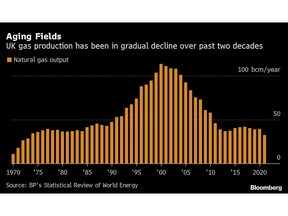Macquarie Targets North Sea as the Green Energy Hub of Europe
Macquarie Group Ltd. is betting the North Sea — engine of the UK’s once-booming oil and gas industry — can be transformed into the green energy hub of Europe.

Article content
(Bloomberg) — Macquarie Group Ltd. is betting the North Sea — engine of the UK’s once-booming oil and gas industry — can be transformed into the green energy hub of Europe.
Advertisement 2
Article content
The Australian bank, one of the top energy-infrastructure investors, has been acquiring offshore wind farms, pipelines and networks that will be in prime position to produce, carry and store the clean hydrogen that could replace gas heating in homes across Britain. It’s poured more than £50 billion into UK assets since 2005, many of which are in the North Sea.
The UK wants to be carbon-neutral by 2050, and clean energy has gained even more momentum since Russia invaded Ukraine. While extracting much more natural gas from the North Sea’s depleted fields may not be possible, its shallow waters and gusty winds are a boon for the renewable electricity needed to make green hydrogen.
“The UK has a great opportunity to be the energy hub of Europe,” Martin Bradley, head of infrastructure investments for Macquarie Asset Management in Europe, Middle East and Africa, said in an interview. “We believe in the North Sea for energy storage. I think UK hydrogen production needs to be offshore.”
Advertisement 3
Article content
The UK and Europe are boosting investments in renewable energy, with the cost of generating electricity from solar and wind falling below that of conventional sources such as coal, gas and nuclear. The climate crisis already highlighted the need to transition to greener forms of energy, but Russia’s war in Ukraine is forcing countries to think of ways to ensure security of supply.
Declining Output
Britain’s stance on phasing out oil and gas has softened in recent months, but increasing production in the North Sea isn’t a long-term option. Output has been declining the past two decades, with aging fields now yielding only about a third of the gas they did in 2000.
Still, the infrastructure built around the fossil-fuels industry, and the roughly 300,000 jobs created, can be easily repurposed for renewable energy, according to the bank, which has interests in 10 offshore wind farms or projects in the North Sea.
Advertisement 4
Article content
“There’s a lot of investment needed, and if governments are worried about energy security, you have to look at renewables,” Bradley said. “That’s where there is the most opportunity because you are not creating a new dependency on someone else.”
With electricity demand expected to double by 2035, the UK is targeting 50 gigawatts of offshore wind by 2030, more than triple the current capacity and enough to power at least 47 million homes.
Britain also wants to build 1 gigawatt of electrolyzers by 2025 as part of a hydrogen strategy set to unlock £9 billion in investment.
“There’s an opportunity here to combine one of the lowest-cost forms of established renewables in terms of offshore wind, and combine it with hydrogen, which is going to do the lion’s share of the decarbonization,” said Ed Northam, head of Macquarie Asset Management’s Green Investment Group in the UK and Europe.
Advertisement 5
Article content
Hydrogen Production
The bank’s offshore wind projects will produce green hydrogen by 2030, he said. The fuel will be transported to customers through its investment in Cadent Gas Ltd. — which runs half of the eight local gas distribution networks. Macquarie also invested in Storegga Ltd., which is developing the Acorn blue hydrogen project.
To be sure, Britain faces competition from the Netherlands, which is lining up industrial customers to use the fuel in manufacturing. And Macquarie also has to vie with some of Europe’s major oil companies, which are planning large-scale investments in green hydrogen.
The bank bought a controlling stake in the UK’s gas grid in a deal that valued the transmission system at about £10 billion. Some of that infrastructure could become stranded assets if not converted to carry hydrogen. It also will be costly to replace the conventional gas boilers that heat 85% of British homes.
Advertisement 6
Article content
“We have already invested in transmission and distribution infrastructure, not because we are investing in the old economy, but because this will have a key role to play in any net-zero scenario,” Bradley said.
Still, the UK has been preparing to transport gas with 20% hydrogen mixed in, replacing old Victorian-era iron pipes with plastic ones. The grid is expected to be ready to carry the blend by 2023, and appliances can cope with it.
This Village in England Is Already Using Hydrogen to Heat Homes
“The head start that the UK has on this is enormous,” Bradley said. “The pipes will be hydrogen-ready.”
Advertisement
For all the latest Business News Click Here
For the latest news and updates, follow us on Google News.

